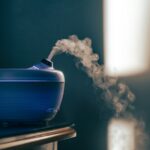Aromatherapy is a holistic healing practice that uses natural plant extracts, known as essential oils, to promote physical and emotional well-being. The term “aromatherapy” is derived from the Greek words “aroma,” meaning fragrance, and “therapy,” meaning treatment. It is believed that inhaling the aroma of essential oils can stimulate brain function and affect the body’s physiological responses.
Essential oils are highly concentrated plant extracts that are obtained through various methods such as steam distillation or cold pressing. These oils contain the natural essence of the plant, including its fragrance and therapeutic properties. When inhaled or applied topically, essential oils can interact with the body’s limbic system, which is responsible for emotions, memory, and behavior.
It is important to note that not all essential oils are created equal. The quality of the oil can greatly impact its effectiveness and safety. It is crucial to use high-quality essential oils that are pure and free from synthetic additives or contaminants. Look for oils that are labeled as 100% pure and therapeutic grade.
The History of Aromatherapy: From Ancient Times to Modern Day
The use of aromatic plants for healing purposes dates back thousands of years. Ancient civilizations such as the Egyptians, Greeks, and Chinese recognized the therapeutic properties of plants and incorporated them into their medical practices.
The Egyptians were known for their extensive use of aromatic plants in religious rituals, cosmetics, and medicinal treatments. They used essential oils for embalming, as well as for treating various ailments. The Greeks also valued the healing properties of plants and used them in their baths and massages.
In China, aromatherapy was an integral part of traditional medicine. The Chinese believed that certain scents could balance the body’s energy and promote overall health. They used essential oils in acupuncture treatments and herbal remedies.
Over time, aromatherapy has evolved and been influenced by different cultures. In the 20th century, French chemist René-Maurice Gattefossé coined the term “aromatherapy” and conducted extensive research on the therapeutic properties of essential oils. His work laid the foundation for modern aromatherapy practices.
The Benefits of Aromatherapy: How It Can Improve Your Mood and Health
Aromatherapy offers a wide range of physical and emotional benefits. The inhalation of essential oils can have a direct impact on the brain and nervous system, promoting relaxation, reducing stress, and improving mood.
One of the key benefits of aromatherapy is its ability to help with stress, anxiety, and depression. Certain essential oils, such as lavender and chamomile, have calming properties that can help alleviate feelings of anxiety and promote a sense of relaxation. Studies have shown that inhaling lavender oil can reduce anxiety levels and improve sleep quality.
Aromatherapy can also play a role in pain management. Essential oils like peppermint and eucalyptus have analgesic properties that can help relieve headaches, muscle pain, and inflammation. These oils can be applied topically or used in massage therapy to target specific areas of pain.
The Different Types of Essential Oils and Their Properties
There are hundreds of essential oils available, each with its own unique properties and benefits. Some of the most common essential oils include lavender, peppermint, eucalyptus, tea tree, and lemon.
Lavender oil is known for its calming and soothing properties. It can help promote relaxation, reduce anxiety, and improve sleep quality. Peppermint oil has a cooling effect and can be used to relieve headaches, muscle pain, and digestive issues. Eucalyptus oil is often used for respiratory conditions such as coughs and congestion. Tea tree oil has antimicrobial properties and can be used to treat acne and fungal infections. Lemon oil is uplifting and can help improve mood and concentration.
When choosing an essential oil, it is important to consider your specific needs and preferences. Some oils may be more suitable for certain conditions or skin types. It is also beneficial to experiment with different oils and blends to find what works best for you.
How to Use Essential Oils: Methods and Precautions
There are several methods of using essential oils, including inhalation, topical application, and ingestion. Inhalation is one of the most common methods and can be done by diffusing the oil in a diffuser or inhaling directly from the bottle. Topical application involves diluting the oil with a carrier oil, such as coconut or jojoba oil, and applying it to the skin. Ingestion should only be done under the guidance of a qualified aromatherapist or healthcare professional.
It is important to take safety precautions when using essential oils. Some oils may cause skin irritation or allergic reactions, especially when used undiluted. It is recommended to perform a patch test before applying an oil to a larger area of the skin. Essential oils should also be kept out of reach of children and pets.
Proper dilution is essential when using essential oils topically. The general rule of thumb is to use a 2-3% dilution, which means adding 12-15 drops of essential oil per ounce of carrier oil. However, some oils may require a higher or lower dilution depending on their potency and intended use.
The Role of Aromatherapy in Stress Relief and Relaxation
Stress has become a common part of modern life, and finding effective ways to manage it is crucial for overall well-being. Aromatherapy can be a powerful tool for stress relief and relaxation.
Certain essential oils have been shown to have calming properties that can help reduce stress and anxiety. Lavender oil, in particular, has been extensively studied for its stress-relieving effects. Inhaling lavender oil or using it in a bath or massage can promote relaxation and improve sleep quality.
Other essential oils that can help with stress relief include chamomile, bergamot, and ylang-ylang. These oils have soothing and uplifting properties that can help calm the mind and promote a sense of well-being.
Incorporating aromatherapy into your self-care routine can be a simple and effective way to manage stress. You can create a relaxing atmosphere by diffusing essential oils in your home or office, or by using them in a bath or shower. Taking time to practice deep breathing and mindfulness while inhaling the aroma of essential oils can further enhance their stress-relieving benefits.
Aromatherapy for Better Sleep: How to Improve Your Sleep Quality
Getting enough quality sleep is essential for overall health and well-being. Aromatherapy can be a natural and effective way to improve sleep quality and promote relaxation before bedtime.
Certain essential oils have sedative properties that can help calm the mind and prepare the body for sleep. Lavender oil is one of the most popular choices for promoting sleep. Its relaxing aroma can help reduce anxiety and promote a sense of calmness. Other essential oils that can aid in sleep include chamomile, vetiver, and sandalwood.
There are several ways to incorporate aromatherapy into your bedtime routine. You can diffuse essential oils in your bedroom before going to sleep or add a few drops to a warm bath. Applying diluted essential oils to your pulse points or using them in a massage can also help promote relaxation and improve sleep quality.
Creating a relaxing bedtime routine that includes aromatherapy can signal to your body that it is time to wind down and prepare for sleep. It is important to establish consistent sleep habits and create a sleep-friendly environment to optimize the benefits of aromatherapy for better sleep.
Aromatherapy for Pain Relief: Natural Remedies for Common Ailments
Aromatherapy can be a natural and effective way to manage pain and promote healing. Essential oils have analgesic and anti-inflammatory properties that can help alleviate various types of pain, including headaches, muscle pain, and joint pain.
Peppermint oil is commonly used for headache relief. Its cooling effect can help reduce tension and ease headache symptoms. Applying diluted peppermint oil to the temples or inhaling its aroma can provide quick relief.
For muscle pain and inflammation, essential oils such as eucalyptus, lavender, and rosemary can be beneficial. These oils have analgesic and anti-inflammatory properties that can help reduce pain and promote healing. They can be used in massage therapy or added to a warm bath to target specific areas of pain.
Aromatherapy can also be helpful for managing chronic pain conditions such as arthritis or fibromyalgia. Essential oils like frankincense, ginger, and helichrysum have anti-inflammatory properties that can help reduce pain and improve mobility. These oils can be used in massage blends or added to a carrier oil for topical application.
It is important to note that aromatherapy should not replace medical treatment for chronic or severe pain conditions. It can be used as a complementary therapy to support pain management and promote overall well-being.
Aromatherapy for Skin Care: How to Achieve a Healthy and Glowing Complexion
Aromatherapy can be a natural and effective way to achieve healthy and glowing skin. Essential oils have various properties that can benefit different skin types and conditions.
For dry or mature skin, essential oils like rose, geranium, and frankincense can help hydrate and nourish the skin. These oils have moisturizing properties that can improve skin elasticity and reduce the appearance of fine lines and wrinkles. They can be added to a carrier oil or used in facial serums and creams.
For oily or acne-prone skin, essential oils such as tea tree, lavender, and lemon can be beneficial. These oils have antimicrobial properties that can help reduce acne-causing bacteria and balance sebum production. They can be added to a gentle cleanser or used in a facial steam to cleanse and purify the skin.
Sensitive skin can benefit from gentle essential oils such as chamomile, neroli, and calendula. These oils have soothing properties that can help calm inflammation and reduce redness. They can be added to a carrier oil or used in a gentle toner or moisturizer.
When using essential oils for skincare, it is important to dilute them properly and perform a patch test before applying them to a larger area of the skin. It is also recommended to consult with a qualified aromatherapist or skincare professional for personalized advice and recommendations.
Aromatherapy for Mental Clarity and Focus: Boosting Your Brain Power
Aromatherapy can be a natural and effective way to enhance mental clarity, focus, and productivity. Certain essential oils have stimulating properties that can help improve cognitive function and concentration.
Rosemary oil is known for its ability to enhance memory and mental alertness. Inhaling its aroma or using it in a diffuser can help improve focus and retention. Peppermint oil has invigorating properties that can help increase alertness and mental clarity. It can be inhaled directly or used in a diffuser during study or work sessions.
Lemon oil is uplifting and can help improve mood and concentration. Its fresh aroma can help clear the mind and promote mental clarity. It can be diffused in the workspace or added to a personal inhaler for on-the-go use.
Other essential oils that can aid in mental clarity and focus include basil, cedarwood, and vetiver. These oils have grounding properties that can help calm the mind and improve concentration. They can be used in a diffuser or added to a carrier oil for topical application.
Incorporating aromatherapy into your study or work routine can help create a focused and productive environment. It is important to choose essential oils that resonate with you and experiment with different blends to find what works best for your individual needs.
Incorporating Aromatherapy into Your Daily Routine for Optimal Health and Wellness
Incorporating aromatherapy into your daily routine can be a simple and effective way to promote optimal health and wellness. Whether you are looking to manage stress, improve sleep quality, relieve pain, or enhance mental clarity, there is an essential oil that can support your goals.
It is important to remember that aromatherapy is a complementary therapy and should not replace medical treatment or professional advice. If you have any underlying health conditions or concerns, it is recommended to consult with a qualified healthcare professional or aromatherapist before using essential oils.
To incorporate aromatherapy into your daily routine, start by choosing essential oils that resonate with you and align with your goals. Experiment with different methods of use, such as diffusing, topical application, or inhalation, to find what works best for you. Create a self-care ritual that includes aromatherapy, such as a relaxing bath or meditation practice.
Remember to prioritize self-care and wellness in your daily life. Aromatherapy can be a powerful tool for promoting physical and emotional well-being, but it is just one piece of the puzzle. Take time to nourish your body, mind, and spirit through healthy lifestyle choices, regular exercise, proper nutrition, and meaningful connections with others.



